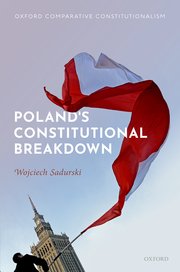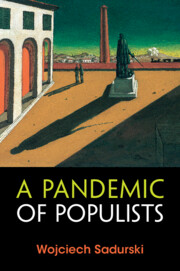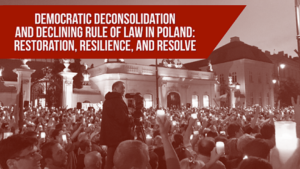 Poland’s ruling authoritarians have fundamentally subverted democracy, including the electoral process. For the democratic opposition to win, it will almost take a miracle, argues Wojciech Sadurski, a Professor at the University of Sydney Law School and the University of Warsaw’s Center for Europe.
Poland’s ruling authoritarians have fundamentally subverted democracy, including the electoral process. For the democratic opposition to win, it will almost take a miracle, argues Wojciech Sadurski, a Professor at the University of Sydney Law School and the University of Warsaw’s Center for Europe.
Whatever the outcome of the elections in Poland that you hear about on or just after 15 October, remember that the field will have been badly skewed in favor of the current rulers, he writes for Euronews. For the democratic opposition to win, it will almost take a miracle. But perhaps it’s not hopeless. Miracles happen, especially in Poland, adds Sadurski, the author of “Poland’s Constitutional Breakdown” and “A Pandemic of Populists”.
Poland’s democratic backsliding started with the courts in Warsaw, the “assault on democracy” has spread to public media and state prosecution services, resulting even in political exiles, as some of those cases have led to people leaving Poland, according to historian Anne Applebaum, a board member of the National Endowment for Democracy (NED).
“We don’t quite have political prisoners yet,” she tells the Times of Israel, “although we could get there.”
But what might happen after the elections? Could a Turkish or Hungarian scenario of degeneration to illiberal democracy be repeated in Poland? ask analysts Jarosław Kuisz and Karolina Wigura, contributors to the NED’s Journal of Democracy.
 In theory, the two main parties contesting the election—Jarosław Kaczyński’s PiS and Donald Tusk’s Civic Coalition (KO)—are head-to-head. Most polls give PiS support of 30 percent or more. Many observers believe that if the opposition were to win, the situation would somehow normalize, and the pre-2015 political system would simply be reestablished. However, things are not quite so simple, they write for Internationale Politik Quarterly:
In theory, the two main parties contesting the election—Jarosław Kaczyński’s PiS and Donald Tusk’s Civic Coalition (KO)—are head-to-head. Most polls give PiS support of 30 percent or more. Many observers believe that if the opposition were to win, the situation would somehow normalize, and the pre-2015 political system would simply be reestablished. However, things are not quite so simple, they write for Internationale Politik Quarterly:
- First, it is not so clear whether the party that wins the elections will be the same one that forms the government. PiS may need the help of the Confederation, a party with fascist tendencies, which will push Poland even further toward authoritarianism. KO may not get along with Trzecia Droga, after many campaign misunderstandings and the humiliation of the leader of the smaller party.
- Second, PiS has made changes to the Polish third estate in an unconstitutional way, while the opposition wants to fix it in accordance with the 1997 constitution. This is an arduous process, during which there may be pushback that the electorate will not like, and which may be torpedoed by President Andrzej Duda (PiS), who will remain in office until 2024, and by the Constitutional Tribunal and the Supreme Court, which are subordinate to PiS, too.

National Endowment for Democracy (NED)
PiS has undertaken a years-long effort to implement reforms of the judicial branch, weakening its independence, adds Freedom House analyst Mike Smeltzer. Since taking office, PiS has curbed the power of top courts, placed progovernment judges on the benches, and scrutinized or reassigned those who display independence. The government, which has ignored criticisms from the European Union (EU), has signaled its intention to go further if it wins another term.
“They’ve just set up this totally unconstitutional committee that’s going to look for Russian influence, which isn’t, of course, going to be real Russian influence,” said Applebaum, leaning on real fear of Russian aggression in the shadow of its ongoing invasion of Ukraine.
“But the people who they’re investigating are just the leaders of the opposition,” she charged. “Literally, they want to investigate the leader of the opposition, Donald Tusk, who was a prime minister for seven years and then was chairman of the European Council, and has a long record of being very clear about [Russian president Vladimir] Putin and clear about Russia. It’s entirely fake.”
Media capture is one of the great causes of democratic backsliding in Central and Eastern Europe, says Edit Zgut-Przybylska, a visiting fellow at the Central European University Democracy Institute and a researcher at the Polish Academy of Sciences. And next month’s election in Poland, despite a burgeoning cash-for-visas scandal rocking the incumbent administration, is largely being framed around a nonsensical referendum question on supposed EU efforts to push illegal migrants into the country, she writes for Foreign Policy.
Taking undecided voters into account and the scandals surrounding PiS that have emerged just before #Poland‘s elections, the opposition could win, @JoDemocracy contributors @kuiszjaroslaw & #KarolinaWigura write for @IPQuarterly. https://t.co/8kqkATIZMc
— Democracy Digest (@demdigest) September 28, 2023







